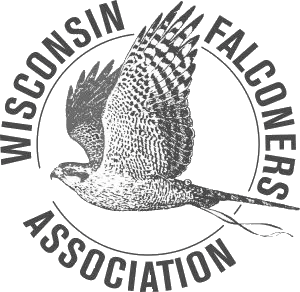Requirements
Most apprentices come into falconry as absolute beginners with little or no prior knowledge. Falconry is not an “overnight” achievement. Do you have the time, money, access to land, efforts, ethics, permits and personality for falconry
Becoming a Master falconer takes at least seven years; finishing your apprenticeship alone will take at least two.
Sponsorship: All new falconers are required to have a sponsor.
The information below will help you to have some basic information as an apprentice and decide if it something you wish to further pursue.
Helpful Links
State of Wisconsin falconry license information – http://dnr.wi.gov/topic/EndangeredResources/permits.html
NR18 rules and regs – http://docs.legis.wisconsin.gov/document/administrativecode/ch.%20NR%2018.pdf
Stacy Rowe at Bureau of Natural Heritage Conservation, Wisconsin Department of Natural Resources
Phone: (608)-266-7012
E-mail: Stacy.Rowe@Wisconsin.gov
For Propagation permits
WI DNR – http://dnr.wi.gov/topic/wildlifehabitat/captive.html
U.S. Fish and Wildlife Service Region 3.
Phone: (612) 713-5421
FAX: (612) 713-5393
or F&W contact liason – Rick Rottman E-mail: Richard_Rottman@fws.gov
Webpage – http://midwest.fws.gov/midwestbird
Apprentice Information
Step 1 – Education: Educate yourself as much as possible. There are many books and videos available on falconry. You can find out recommendations at our education page.
You should also read through the application procedures through this link http://dnr.wi.gov/topic/EndangeredResources/permits.html, then click on Falconry.
Any additional questions you might have can be addressed to:
Stacy Rowe at Bureau of Natural Heritage Conservation
Wisconsin Department of Natural Resources Phone: (608)-266-7012 E-mail: Stacy.Rowe@Wisconsin.gov
Step 2 – Sponsorship: Once you become familiar with the application procedures, you should get out hawking to see if falconry seems right for you by contacting a licensed falconer or the Apprentice Coordinator- Abbey Krumrie.
As you may already know, falconry is the sport of ‘hunting’ with birds of prey. It takes a great deal of time and dedication to become a competent falconer. Most falconers, before they will agree to help anyone new to the sport, will require evidence of a serious, committed interest in falconry. As an apprentice you will need to be able to take direction, advice and be long on patience with your bird. For this reason, the majority of sponsors will require prospective apprentices to follow them along on hunts for perhaps a full hunting season to see that they have the time and commitment to properly pursue the sport. This is also very valuable to prospective apprentices because, not only will they gain valuable first hand experience but they will also get a good understanding of the time and commitment involved and can make a more informed decision about getting into the sport. Our hunting season is typically in full swing by mid October and winds down for most by mid February.
Step 3 – Testing and inspection: Schedule to take the falconry exam at your local DNR service center. You must pass with a score of 80% or higher. You will also need to build mews, have the necessary falconry equipment for your bird, and pass an inspection by the DNR.
Step 4 – Licenses: Includes a state falconry permit. Your state falconry permit is your small games license. Turkey permit or Migratory Bird Stamp depending on your planned take.
Frequently Asked Questions
How much time does this take?
Your hawk will require a significant amount of time, 7 days per week, 365 days a year, and a bird in training requires substantially more time. Raptors cannot be simply put away in the closet until your next time out hunting. Make sure your family and career are okay with this time commitment.
Where and what kind of bird should I get?
You will be required to trap your own bird. Trapping is not necessarily difficult, but it is something you will learn about as you study for the exam. It is also something that should be done with your sponsor, if at all possible. All apprentices have two basic options: a Red-Tailed Hawk or an American Kestrel (falcon).
How much will the care of my bird cost me?
Most people immediately think, “How much will a bird cost?” There is much more to consider such as: You must be able to cover expenses for food, shelter, equipment, veterinary costs, permits and fees, and travel. To keep your bird healthy, you must feed your raptor preferably the exact same whole birds or mammals they would catch on their own if in the wild. Housing and equipment requirements are mandated by state and federal law. (Remember you will be inspected before you are permitted to acquire a hawk.) Most falconers also spend considerable amounts of money on books as a source of necessary information and enjoyment. You will have to pay permit and license fees as well. Travel expenses to meets, training, and hunting with other falconers adds up fast.
Does falconry damage wild raptor populations?
Studies show that approximately 60-70% of immature raptors die in their first year. Every time a falconer traps a passage raptor (one less than a year old), there are at least two probable results. The first is that the particular bird trapped will be helped to transition into its second year of life, which would only have a 25 – 50% chance of doing on its own in the wild. Second, one less bird has been temporarily removed from the competition for food and habitat. Most falconry birds are released back to the wild, usually after 1 or 2 hunting seasons. One could argue that falconry actually benefits wild raptor populations. There are too few falconers in the United States to truly impact wild raptor populations one way or the other. The demise of raptor populations is loss of habitat, lack of prey and human inflicted injuries.
This information is only to give you an overview of the time and commitment involved in training and properly caring for a raptor. Whether you choose to become a falconer or not, the Wisconsin Falconer’s urge your continued interest in raptors and their conservation.
